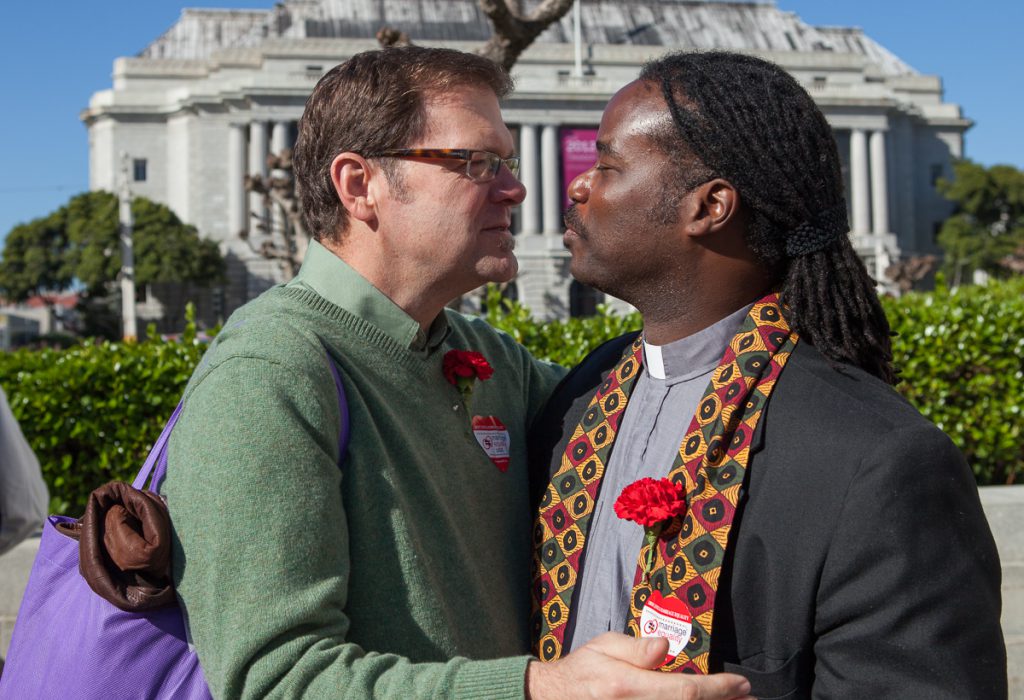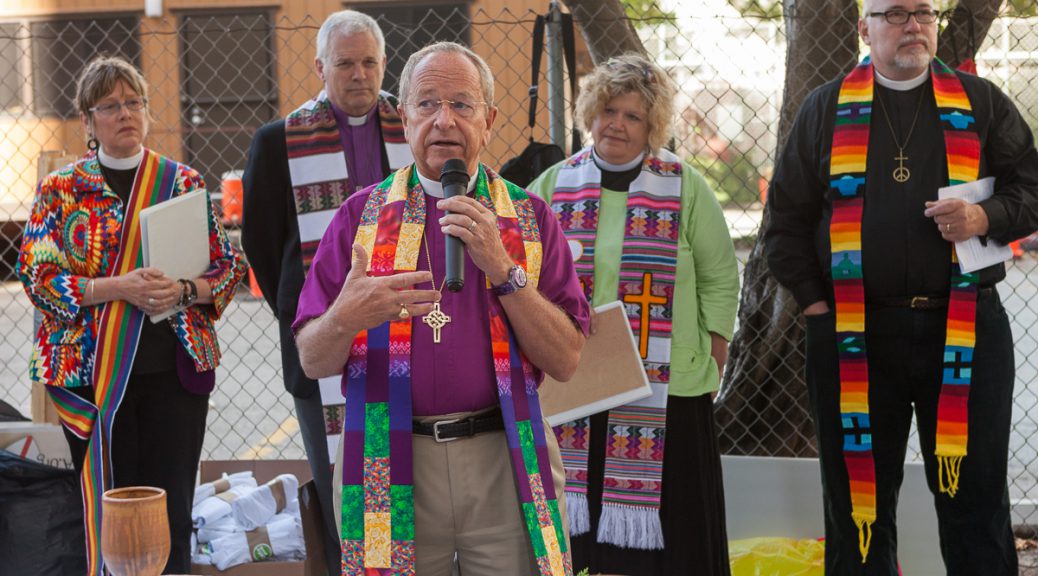[Image: Bishop Gene Robinson speaks into a microphone, accompanied by four other ministers.]
Back around 1990, I took a class called “Religion and Politics” from Professor Garry Wills* at Northwestern University. The man—a practicing Catholic—was so unassuming that I mistook him for a janitor on first encounter; I only found out later that he was actually rather famous. I learned from his class that the USA was one of the most religious—Christian, specifically—countries in the world, second only to Ireland in regular church attendance. Twenty-odd years later, I read Society without God by sociologist Phil Zuckerman, and learned that the USA was still far more religious than most other Western countries.
I had these facts in mind when reading an article in The Guardian about the Wikileaks revelation of an apparent DNC strategy to discredit Bernie Sanders based on his supposed atheism. As the article states and as I can verify from my own experience, many Jews in the USA are atheists or agnostics; one can claim a Jewish identity without a belief in God. (Green presidential candidate Jill Stein is an agnostic Jew, for example.) The same cannot be readily said of Christianity, although from reading Society without God I learned that there are many “cultural” Christians in Europe who are actually atheists. (In fact, the countries Zuckerman visited that had official state religions had far, far fewer religious adherents than the USA, where we supposedly have separation of church and state.)
In the article about Sanders, a Jewish supporter of Hillary Clinton states, “I’m gay and America would have less of a problem with a gay president than an atheist president.” I wouldn’t be surprised if this were true. Our country is and always has been overwhelmingly religious, and overwhelmingly Christian. Outside of progressive hubs like the San Francisco Bay Area, where I live, atheists are still looked upon with distrust.
Some Christians are becoming more tolerant of the LGBT community, and I’ve spent a lot of time around queer religious people as part of the fight for marriage equality. I took the photo at the top of this post at a Eucharist ceremony (the only one I’ve attended to date), just prior to the 2011 San Francisco Pride Parade. Gene Robinson, pictured speaking, became the first openly gay Episcopalian bishop.
 [Image: Jerry Peterson and Reverend Roland Stringfellow embrace at a marriage equality rally.]
[Image: Jerry Peterson and Reverend Roland Stringfellow embrace at a marriage equality rally.]
I was hired to shoot the parade by Reverend Roland Stringfellow of the Coalition of Welcoming Congregations, pictured above in 2012 with his now-husband Jerry Peterson. Yes, in San Francisco we have plenty of openly gay interracial couples. But we still have respectability politics, and a dark-skinned black man with locs like Stringfellow is still at risk of police profiling, even if he is a Christian minister. (He and his husband-to-be had actually just been released from police custody when I took this photo, but their annual Valentine’s Day marriage equality sit-in at City Hall had been conducted with the police department’s prior knowledge and full cooperation.)
Religion and respectability politics are part of why I’ve heard nearly as much mention of God at the Democratic National Convention as I did at the Republican event. President Obama might have thrown a crumb to atheists by acknowledging “non-believers” in his inaugural address, but we’re still not fully trusted by the US-American public. Religious institutions get tax breaks, God is on our currency and in our Pledge of Allegiance (though the latter only since the 1950s), and most public officials swear in on Bibles. People who don’t care much about religion might not notice or be bothered by it, but when you’re a committed atheist, religion—and Christianity specifically—is very much in-your-face.
Our theistic, Christian foundation is part of why I don’t think our government can be reformed, even by third parties, to my satisfaction. What viable candidate is really going to call for complete pacifism? We now have a pair of vegan candidates in the Humane Party’s Clifton Roberts and Breeze Harper, but I’m still not convinced that continuing with our current system of government is a good plan.
Hearing Democrats at their convention compete with Republicans for who could praise our “great country” and military might the most just crystallized for me how unpatriotic I’ve become. I don’t agree that we’re the greatest country on Earth. I don’t have a better one in mind because I haven’t traveled abroad much. I’m just not into this “us versus them” mentality. I’m a US citizen by accident of birth, not by choice. And I’m questioning more and more every day whether or not I really want to stay here.
*ETA: Interesting analysis (from 1995) by Wills of the right to bear arms, in light of our country’s current debate over the Second Amendment.
